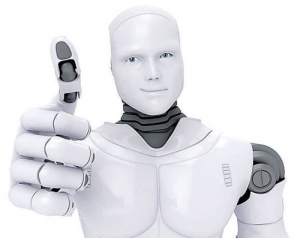What initially was portrayed as science fiction in movies would soon turn into reality when robots learn to imitate and perform human actions and behaviour.
Social learning is fundamental in psychology and engineering which explains that new behaviour can be learnt by imitating and observing others. What if this fundamental theory could be applied in robot learning? How would it affect you if a robot were to imitate your very behaviour?

Let’s suppose you put on a shoe and start kicking a football. As a human, you understand ball as an object that is to be played with. A robot, using smallest configuration can also be instructed to replicate your behaviour. However, would a robot be able to distinguish the difference between a ball and a chair? What if robot kicks a chair along with the ball as it is learning to imitate your kicking? This error may be caused by the fact that the robot will identify both the chair and the ball as an object and treat them equally.
Furthermore, using an experimental approach, engineers have further tried to understand the extent a robot will imitate an action, and would the robot be able to identify the action relevancy? However, due to lack of emotional tendencies in a developing robot, its actions would be accepted as radical in our society. But this is just one of the several complications that limit the learning and innovation in robots as the risk of advancement in robots outweighs the benefit.
Through the means of constant repetitions, an animations device or a developing robot can adapt playback of the actions. However, this repetitive playbacks are non-interactive, as the robots do not evolve and change their actions based on the environment. Instead, the robots glue themselves to the repetition movements. Another method that has been successful, to some extent, has been teaching a robot how to navigate a maze using simple perception. Using a dog that is will adept at manuevering the environment, the robot is able to learn its way through the puzzle and store the solution in its hard drives for future purposes
I wonder if you enjoy sarcasm and irony? Well, who doesn’t!
As we talk with our friends and families, we like to throw in a sarcastic comments to brighten the conversation. But I hate to break it to you that another issue that sends shiver down the spine of the engineers and researchers is what if the robot is unable to distinguish sarcasm and irony from seriousness as it is learning to imitate. This would motivate the robot to perform actions based on the sarcastic comment that would otherwise be unnecessary or dangerous.

On the other hand, should the social learning in robots be successful, you would soon have a intelligent companion who would bring comfort to your life and be your butler for as little as 399$. JUST GO EASY ON THE SARCASM!
Citation:
Breazeal, C., & Scassellati, B. (2002). Robots that imitate humans. Trends in Cognitive Sciences, 6(11), 481–487. https://doi.org/10.1016/s1364-6613(02)02016-8
Robots may replace humans. (2016, October 7). Deccan Herald. https://www.deccanherald.com/content/574634/robots-may-replace-humans-nursing.html
A Massive New Library of 3D Images Could Help Your Robot Butler Get Around Your House. (2017, April 26). Communications of the ACM. https://cacm.acm.org/news/216399-a-massive-new-library-of-3d-images-could-help-your-robot-butler-get-around-your-house/fulltext

Haseeb – one of the most difficult areas for linguistics researchers is describing how sarcasm functions, and as a teacher, it’s something that’s quite hard to teach! So, I have my doubts that robots will be able to learn it as well as humans 🙂
-Edie